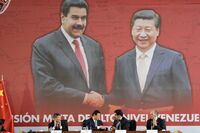https://mixi.media/newdata/adprevie...utm_term=2a037284-a8a2-42de-b6e3-adc8fb5341b9
Thursday, Aug. 15, 4:50 PM
D&J Index:
25,484.60
0
S&P 500 Index:
2,840.60
0
Nasdaq:
7,773.94
0
Most Popular

Steve King: If Not For Rape And Incest, 'Would There Be Any Population Left?
https://mixi.media/newdata/news?ad=...1&bvuuid=a1b14af3-bacb-4161-a46e-fce6c0d8ea08
China Comes to the Rescue of Venezuela’s Run-Down Oil Refineries
https://www.bloomberg.com/news/articles/2019-08-07/china-comes-to-the-rescue-of-venezuela-s-run-down-oil-refineries
Bloomberg
Sign InSubscribe
Photographer: Diego Giudice/Bloomberg
business
China Comes to the Rescue of Venezuela’s Run-Down Oil Refineries
By
Peter Millard
and
Fabiola Zerpa
August 8, 2019, 2:23 AM GMT+8 Updated on August 8, 2019, 12:00 PM GMT+8
LISTEN TO ARTICLE
4:30
SHARE THIS ARTICLE
Share
Tweet
Post
Email
In this article
CL1
WTI Crude
55.21
USD/bbl.
-0.02-0.04%
XB1
Generic 1st 'XB' Future
167.13
USd/gal.
-0.45-0.27%
2236
WISON ENGINEERIN
1.00
HKD
+0.01+1.01%
CVX
CHEVRON CORP
117.74
USD
-4.65-3.80%
Sign up for Next China, a weekly dispatch on where the country stands now and where it's going next.
A Chinese contractor has agreed to shore up Venezuela’s derelict refining network to ease fuel shortages, potentially complicating the Trump administration’s push for regime change in the oil-rich country.
Wison Engineering Services Co., a Shanghai-based chemical engineering and construction company that is using China’s ‘Belt and Road’ infrastructure program to expand overseas, agreed last month to repair Venezuela’s main refineries in exchange for oil products including diesel, according to people with knowledge of the deal.
U.S. financial sanctions aimed at starving the current regime of revenue contributed to the decision to revive a domestic refining industry crippled by years of mismanagement and under-investment, said one of the people, who asked not to be identified because the information is confidential.

Venezuelan President Nicolas Maduro (2-R) shakes hands with China’s Xi Jinping (2-L) in Caracas
LEO RAMIREZ/AFP/Getty Images
The deal mirrors the OPEC producer’s other arrangements with Russian and Chinese oil majors, under which payments are made in crude by Venezuela’s cash-strapped national oil company.
Wison’s repairs are expected to last six months to a year, according to another person. The Nicolas Maduro administration was having difficulties navigating the U.S. economic blockade even before the U.S. announced additional restrictions on Aug. 5. Last month state-controlled Petroleos de Venezuela SA was importing Russian gasoline through Malta to relieve shortages, a slow and expensive route to the Caribbean nation.
Irregular Supply
Irregular fuel supplies have crippled mobility in a country where shortages of food and basic medical supplies have already caused a health crisis and led to one of the largest mass migrations of recent times. PDVSA, as the state producer is known, has been directing most available gasoline to Caracas, where Maduro is most vulnerable to mass protests.
The Trump administration was hoping to swiftly chase Maduro out of power earlier this year, and has criticized China and Russia for supporting what it considers a criminal and repressive regime.
Wison didn’t respond to an email or fax seeking comment on the refinery contract. PDVSA didn’t respond to emails and calls seeking comment.
The Chinese company hasn’t completed a contract it won in 2012 to overhaul the Puerto la Cruz refinery. Wison’s revenue from Venezuela sank 72% last year as the nation’s economic crisis deepened, according to it’s annual report.
China and Russia have an interest in preventing the complete collapse of Venezuela’s oil industry because it’s the only way to recoup the tens of billions of dollars in loans and investments they have made in the past decade. Wison’s deal also underscores how the oil-hungry Asian nation remains committed to Venezuela as a strategic location for foreign investment.
Economic Blockade
Restoring fuel production, if it happens fast enough, would weaken the U.S. economic blockade and put Maduro in a stronger negotiating position as talks with the opposition drag on without any visible progress.
Despite Venezuelans’ widespread dissatisfaction with their government, divisions within the opposition are complicating the push toward a post-Maduro administration. While about 50 nations recognize National Assembly President Juan Guaido as the country’s interim president, China has declined to get involved in what it considers an internal conflict.
More coverage of the crisis in Venezuela:
Venezuela’s refining industry, once a major supplier to the U.S. with 1.3 million barrels a day of capacity, has been in gradual decline due to theft, inadequate maintenance and a brain drain of qualified staff, and was hit by a series of major power outages this year. In recent years, PDVSA hasn’t even been able to meet domestic gasoline demand that has historically been about 250,000 barrels a day.
The U.S. has so far shied away from military intervention in Venezuela and has instead imposed economic sanctions that target the oil industry and key members of the government and the military. American officials continue to project confidence about replacing Maduro with a pro-business administration despite the lack of progress.
China rejects “foreign interventions and unilateral sanctions” in Venezuela, and supports dialogue between the government and the opposition, its embassy in Caracas said in a statement on May 12. The embassy didn’t immediately offer additional comments when contacted by Bloomberg.
China wants “to be identified with a friendly socialist government, especially in the backyard of the U.S.,” said Schreiner Parker, Rystad Energy’s vice president for Latin America. “They have no guarantee that a regime change will necessarily mean that they’re going to be repaid.”
— With assistance by Lucia Kassai, and Alfred Cang
UP NEXT
U.S. Blacklists China Nuclear Firms Accused of Aiding Military
Have a confidential tip for our reporters?
GET IN TOUCH
Before it's here, it's on the Bloomberg Terminal.
LEARN MORE
by Taboola
Sponsored Links
Thursday, Aug. 15, 4:50 PM
D&J Index:
25,484.60
0
S&P 500 Index:
2,840.60
0
Nasdaq:
7,773.94
0
Most Popular

Steve King: If Not For Rape And Incest, 'Would There Be Any Population Left?
https://mixi.media/newdata/news?ad=...1&bvuuid=a1b14af3-bacb-4161-a46e-fce6c0d8ea08
China Comes to the Rescue of Venezuela’s Run-Down Oil Refineries
https://www.bloomberg.com/news/articles/2019-08-07/china-comes-to-the-rescue-of-venezuela-s-run-down-oil-refineries
Bloomberg
Sign InSubscribe
Photographer: Diego Giudice/Bloomberg
business
China Comes to the Rescue of Venezuela’s Run-Down Oil Refineries
By
Peter Millard
and
Fabiola Zerpa
August 8, 2019, 2:23 AM GMT+8 Updated on August 8, 2019, 12:00 PM GMT+8
- Shanghai-based Wison Engineering to carry out urgent repairs
- Venezuela to pay for services with diesel fuel in barter deal
LISTEN TO ARTICLE
4:30
SHARE THIS ARTICLE
Share
Tweet
Post
In this article
CL1
WTI Crude
55.21
USD/bbl.
-0.02-0.04%
XB1
Generic 1st 'XB' Future
167.13
USd/gal.
-0.45-0.27%
2236
WISON ENGINEERIN
1.00
HKD
+0.01+1.01%
CVX
CHEVRON CORP
117.74
USD
-4.65-3.80%
Sign up for Next China, a weekly dispatch on where the country stands now and where it's going next.
A Chinese contractor has agreed to shore up Venezuela’s derelict refining network to ease fuel shortages, potentially complicating the Trump administration’s push for regime change in the oil-rich country.
Wison Engineering Services Co., a Shanghai-based chemical engineering and construction company that is using China’s ‘Belt and Road’ infrastructure program to expand overseas, agreed last month to repair Venezuela’s main refineries in exchange for oil products including diesel, according to people with knowledge of the deal.
U.S. financial sanctions aimed at starving the current regime of revenue contributed to the decision to revive a domestic refining industry crippled by years of mismanagement and under-investment, said one of the people, who asked not to be identified because the information is confidential.

Venezuelan President Nicolas Maduro (2-R) shakes hands with China’s Xi Jinping (2-L) in Caracas
LEO RAMIREZ/AFP/Getty Images
The deal mirrors the OPEC producer’s other arrangements with Russian and Chinese oil majors, under which payments are made in crude by Venezuela’s cash-strapped national oil company.
Wison’s repairs are expected to last six months to a year, according to another person. The Nicolas Maduro administration was having difficulties navigating the U.S. economic blockade even before the U.S. announced additional restrictions on Aug. 5. Last month state-controlled Petroleos de Venezuela SA was importing Russian gasoline through Malta to relieve shortages, a slow and expensive route to the Caribbean nation.
Irregular Supply
Irregular fuel supplies have crippled mobility in a country where shortages of food and basic medical supplies have already caused a health crisis and led to one of the largest mass migrations of recent times. PDVSA, as the state producer is known, has been directing most available gasoline to Caracas, where Maduro is most vulnerable to mass protests.
The Trump administration was hoping to swiftly chase Maduro out of power earlier this year, and has criticized China and Russia for supporting what it considers a criminal and repressive regime.
Wison didn’t respond to an email or fax seeking comment on the refinery contract. PDVSA didn’t respond to emails and calls seeking comment.
The Chinese company hasn’t completed a contract it won in 2012 to overhaul the Puerto la Cruz refinery. Wison’s revenue from Venezuela sank 72% last year as the nation’s economic crisis deepened, according to it’s annual report.
China and Russia have an interest in preventing the complete collapse of Venezuela’s oil industry because it’s the only way to recoup the tens of billions of dollars in loans and investments they have made in the past decade. Wison’s deal also underscores how the oil-hungry Asian nation remains committed to Venezuela as a strategic location for foreign investment.
Economic Blockade
Restoring fuel production, if it happens fast enough, would weaken the U.S. economic blockade and put Maduro in a stronger negotiating position as talks with the opposition drag on without any visible progress.
Despite Venezuelans’ widespread dissatisfaction with their government, divisions within the opposition are complicating the push toward a post-Maduro administration. While about 50 nations recognize National Assembly President Juan Guaido as the country’s interim president, China has declined to get involved in what it considers an internal conflict.
More coverage of the crisis in Venezuela:
- Trump Imposes New Curbs on Venezuela to Force Maduro Out
- Ross Maps Sweeping Venezuela Plan Even as Maduro Refuses to Go
- Chevron Wins 90-Day Venezuela Waiver Despite Agency Opposition
Venezuela’s refining industry, once a major supplier to the U.S. with 1.3 million barrels a day of capacity, has been in gradual decline due to theft, inadequate maintenance and a brain drain of qualified staff, and was hit by a series of major power outages this year. In recent years, PDVSA hasn’t even been able to meet domestic gasoline demand that has historically been about 250,000 barrels a day.
The U.S. has so far shied away from military intervention in Venezuela and has instead imposed economic sanctions that target the oil industry and key members of the government and the military. American officials continue to project confidence about replacing Maduro with a pro-business administration despite the lack of progress.
China rejects “foreign interventions and unilateral sanctions” in Venezuela, and supports dialogue between the government and the opposition, its embassy in Caracas said in a statement on May 12. The embassy didn’t immediately offer additional comments when contacted by Bloomberg.
China wants “to be identified with a friendly socialist government, especially in the backyard of the U.S.,” said Schreiner Parker, Rystad Energy’s vice president for Latin America. “They have no guarantee that a regime change will necessarily mean that they’re going to be repaid.”
— With assistance by Lucia Kassai, and Alfred Cang
UP NEXT
U.S. Blacklists China Nuclear Firms Accused of Aiding Military
Have a confidential tip for our reporters?
GET IN TOUCH
Before it's here, it's on the Bloomberg Terminal.
LEARN MORE
by Taboola
Sponsored Links
